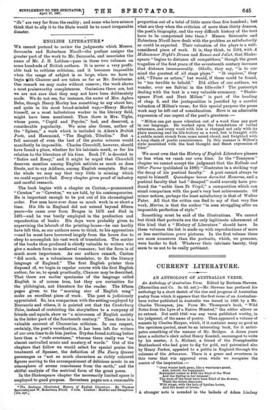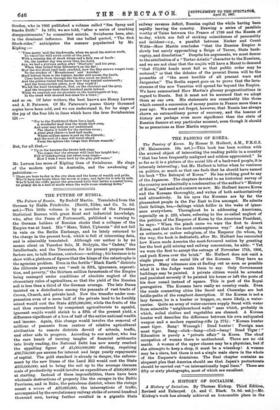CURRENT LITERATURE.
AN ANTHOLOGY OF AITSTRALIAN VERSE.
An Anthology of Australian Verse. Edited by Bertram Stevens. (Macmillan and Co. 3s. 6d. net.)—Mr. Stevens has prefaced his anthology by a short sketch of the rise and progress of Australian poetry from which it appears that the first verse of an Australian- born writer published in Australia was issued in 1826 by a Mr. Charles Thompson, jun. From Mr. Thompson's book, " Wild Notes from the Lyre of a Native Minstrel," the editor allows us no extract. Not until 1845 was any verse published worthy, in his judgment, of the name of poetry. Then appeared a volume of sonnets by Charles Harper, which, if it contains many as good as the specimen quoted, must be an interesting book, for it antici- pates something of the manner of Mr. Bridges. A dozen years later a solicitor's clerk called Henry Kendall, encouraged to write by his master, B. L. Michael, a friend of the Preraphaelite Brotherhood who had gone to dig' for gold, and patronised also by Henry Parkes, appealed to a public in England through the columns of the Atheneum. There is a grace and sweetness in this verse that win approval even while we recognise the source of the inspiration .— " Grey winter bath gone, like a wearisome guest, And, behold, for repayment.
September comes in with the wind of the West And the Spring is ber raiment I The ways of the frost have been filled of the Rowers, While the forest discovers Wild wings, with the halo of hyaline hours, And the music of lovers."
A stronger note is sounded in the ballads of Adam Lindsay Gordon, who in 1866 published a volume called "Sea Spray and Smoke Drift." In 1870, we are told, "after a series of crushing disappointments," he committed suicide. Swiuburne here, also, is the dominant influence. But one ballad quoted, "The Sick Stock-rider," anticipates the manner popularised by Mr. Kipling :— " 'Terns merry 'mid the blackwoods, when we spied the station roofs,
To wheel the wild scrub cattle at the yard,
With a running flee of stock whips and a fiery rim of hoofs Oh, the hardest day wee never then too hard. Aye, we had a glorious gallop after 'Starlight and his gang.
When they bolted from Sylvester's on the fiat ; How the sun-dried reed-beds crackled, how the flint-strewn ranges rang. To the strokes of 'Mountaineer and ' Acrobat.'
Hard belied them in the timber, harder still across the heath, Close beside them through the tert.tree scrub we daah'd ; And the golden-tinted fern leaves, how they rustled underneath; And the honeysuckle osiers, how they crash'd ! We led the hunt throughout, Ned, on the chestnut and the grey.
And the troopers were three hundred yards behind, While we emptied our six-shooters on the bushrangers at bay,
In the creek with stunted box-trees for a blind;'
and so on. Of later writers, the best known are Henry Lawson and A. B. Paterson. Of Mr. Paterson's poems thirty thousand copies have been sold, and we can understand it, for he sings of the joy of the free life in lines which have the true Swinburnian lilt :—
"Far to the Northward there lies a land, A wonderful land that the winds blow over, And none may fathom nor understand The charm it holds for the restless rover; A great grey chaos—a land half made, Where endless space is and no life stirreth; And the soul of a man will recoil afraid From the ephint-like visage that Nature weareth.'
But, for all that,— " Up to the heavens the brown lark sings
The songs that the strange wild land has taught her;
Full of thanksgiving her sweet song rings— How I wish I were back by the grey gulf-water."
Mr. Lawson has more of Kipling than of Swinburne. He sings of the modern spirit in Australia, and the awakening of patriotism :-
" There are boys to-day in the city slum and the home of wealth and pride Who'll have one home when the storm is come, and fight for it aide by side. Who'll bold the cliffs 'limiest the armoured hells that batter a coastal town, Or grimly die in a hail of shells when the walls come crashing down."



























































 Previous page
Previous page